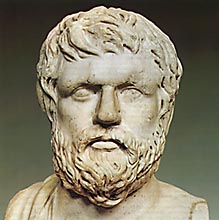Xenophon was born between 431 and 429 B.C. His birthplace was the Attic deme of Erchia, in the neighbourhood of what is now Spata. He died not long after 355 B.C. He was from a well-to-do family, as is shown by his having served in the cavalry arm. Under pressure from friends of his, he joined the mercenary force that campaigned with Cyrus against the Persian king Artaxerxes II. After the battle of Cunaxa and death of Cyrus (401), Xenophon assumed responsibility for the retreat of the Hellene mercenaries to Hellas. For a short time he was in Thrace, serving as a mercenary to Seuthes king of the Odrysians. There he met and married Philesia, the woman with whom he would spend the rest of his life. |
 |
In 399 he was to come into contact with units of the Spartan army, on the coast of Asia Minor. In 396 these were taken over by Agesilaus, whose follower Xenophon became because he was impressed by the latter's personality. With Agesilaus Xenophon fought at Coronea in 394, against a broad anti-Spartan coalition led by Athens and Thebes. The Spartan army won the battle, and because he had been with them, Xenophon was sent into exile from Athens. The Spartiates gave him proxenos status; freedom to live at Sparta; and a large estate at Scillus (not far from Olympia), where he lived for twenty years. The defeat of Sparta by Thebes at the battle of Leuctra (371) obliged Xenophon to move to Corinth. When Athens and Sparta mended their differences in 365, for a showdown with Thebes, the Athenians revoked the law whereby Xenophon had been sent into exile. We do not know when he went back to Athens.
Xenophon left to posterity works on many different subjects. He started writing them, it is believed, once he settled down at Scillus. They are not easy to group or to date. By general agreement, the historical works (Anabasis; Hellenica; Agesilaus; Constitution of the Spartans; Cyropaedia) were the earliest; then followed the works about Socrates, the Socratica, as they are known (Socrates' Apologia; Memorabilia; Symposium); and the last to be written were the teaching manuals (On Horsemanship; On the Cavalry Commander; Oeconomicus; Hieron; Ways and Means).



